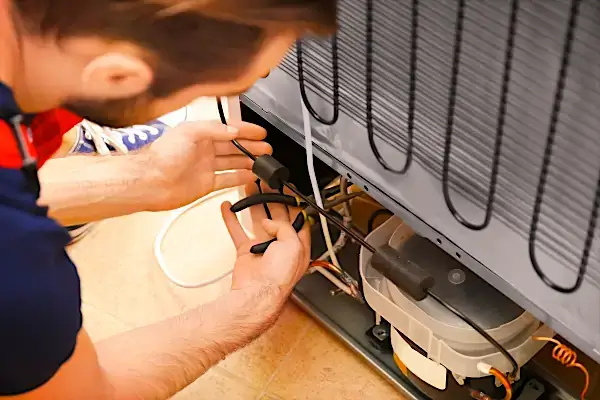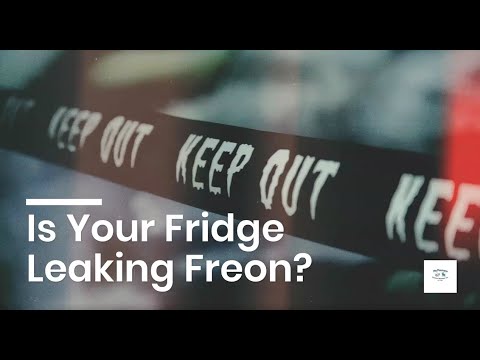Having a refrigerator in your home is an essential part of modern life. After all, what would we do without it? However, like any appliance, refrigerators can suffer from problems. One common problem is a freon leak. So if you’re hearing odd sounds from your fridge or it’s not staying as cold as usual, there may be a freon leak. In this article, we’ll talk about the potential signs of freon leak in refrigerator and how you can fix the problem.
Table Of Contents

What is Freon Leak? Reasons for Freon Leak
Freon, also known as R-22 or HCFC-22, is a colourless, odourless, and non-flammable gas used as a refrigerant in appliances like air conditioners and refrigerators. A Freon leak occurs when this gas escapes from the refrigeration system.
There are several reasons why your refrigerator might have a Freon leak. One of the most common causes is damage to the coils or pipes due to wear and tear or physical harm. Other reasons include manufacturing defects, improper installation, and poor maintenance practices.
Consequences of Ignoring Freon Leak
Ignoring a Freon leak can have severe consequences:
- It can cause your refrigerator to stop cooling, leading to spoiled food and drinks.
- Freon is harmful to the environment and contributes to ozone depletion. If Freon leaks into the air, it can have severe consequences for the planet.
- Freon can harm your health, causing dizziness, nausea, and headaches.
What Are the Signs of Freon Leak in Refrigerator?
A warm refrigerator is one of the most common signs of a Freon leak. Other signs include hissing or bubbling noises from the fridge, ice buildup in the freezer, or decreased cooling capacity. Here are a few signs you might notice if freon is leaking in your refrigerator –
- Warm refrigerator interior: One of the most common signs of a freon leak in a refrigerator is a warm interior. If your fridge is not maintaining the proper temperature, there is a good chance that the freon levels are low. The refrigerator may be running constantly to try to cool the interior. But it won’t work if there isn’t enough refrigerant to cool down the air.
- Frost buildup in the freezer: If you notice frost buildup, it could indicate a freon leak. Frost accumulates when there is excess humidity in the air, and the freezer can’t remove it due to a low refrigerant level. The freezer may also be unable to maintain its temperature, causing the excess moisture to freeze onto the coils.
- Unusual noises coming from the refrigerator: If your fridge makes strange noises, it could indicate a freon leak. When there isn’t enough refrigerant to cool the air, the compressor has to work harder to keep the fridge running, which can cause unusual sounds. You may hear humming, clicking, or hissing noises indicating something is wrong.
- Compressor running constantly: If the compressor runs continuously, it could be due to a freon leak. The compressor is responsible for cooling down the air inside the fridge by compressing the refrigerant. If there isn’t enough refrigerant in the system. In that case, the compressor has to work harder to maintain the proper temperature, which can cause it to run continuously.
- Increased energy bills: If you notice a sudden increase in your energy bills, it could be due to a freon leak. When the refrigerant levels are low, the fridge has to work harder to keep the air cool, which can result in increased energy consumption. Your fridge may run longer and more frequently than it should, leading to a higher energy bill.
- Foul odours: If you notice an unpleasant smell coming from your refrigerator, it could indicate a freon leak. When refrigerant leaks, it can mix with other substances inside the fridge and produce a foul smell. It’s important to address the issue quickly because inhaling the fumes can be harmful to your health.
How to Tell if Fridge Is Leaking Freon?
Let’s check out three methods to help you confirm a Freon leak in your refrigerator.

- Method 1: Call a Professional
The first and most reliable method to confirm a Freon leak in your refrigerator is to call a professional. An HVAC technician or refrigerator repairman will have the tools and equipment to diagnose the issue accurately. Then, they will use a Freon leak detector to determine if there is a leak in the refrigerant line. This method is the most accurate and reliable because professionals are trained to identify and fix these problems.
However, calling a professional can be expensive and may not be practical for everyone. If you are comfortable working with appliances and want to try to identify the problem yourself, there are two more methods you can try.
- Method 2: Use a Leak Detector
The second method to confirm a Freon leak in your refrigerator is to use a leak detector. A leak detector is a tool that can detect Freon leaks in your fridge. The device works by sensing the refrigerant gas in the air and alerting you if there is a leak. You can purchase a leak detector at a hardware store or online, which is relatively easy to use. To use a leak detector, you need to follow these steps:
- Turn off the power to your fridge.
- Remove the grill at the bottom of the fridge.
- Attach the leak detector to the refrigerant line.
- Turn on the leak detector.
- Move the detector along the refrigerant line.
- Watch for any changes in the detector’s readings.
If the leak detector detects a Freon leak, it will beep or light up, alerting you to the problem. However, leak detectors can be expensive, and they may not be very accurate. In some cases, the detector may give a false reading, and you may end up replacing parts that don’t need to be replaced. If you are unsure of how to use a leak detector or don’t have access to one, you can try one more method.
- Method 3: Visual Inspection
The third method to confirm a Freon leak in your refrigerator is to perform a visual inspection. This method is the least reliable of the three but can still help identify the problem. To perform a visual inspection, you need to look for signs of a Freon leak, such as:
- Frost buildup on the evaporator coil.
- A hissing or gurgling sound is coming from the fridge.
- Oil stains on the refrigerant line or compressor.
- A decrease in the fridge’s cooling ability.
If you notice any of these signs, your fridge may be leaking Freon. However, these signs can also indicate other issues with your fridge, such as a clogged air filter or a malfunctioning compressor. Therefore, a visual inspection should only be used as a last resort if you don’t have access to a leak detector or can’t afford to call a professional.
How to Fix a Freon Leak in a Refrigerator?
If you suspect that your refrigerator has a Freon leak, don’t panic. With a few simple steps, you can fix the problem and get your refrigerator back to working correctly.
- Repairing the Leak: Once you’ve identified the leak’s location, it’s time to repair it. Depending on the location of the leak, repairing it can be a straightforward process. If the leak is in the evaporator coils, you’ll need to replace them. You can do this by removing the old coils and replacing them with new ones. If the leak is in the condenser coils, you’ll need to clean them thoroughly to remove any dirt or debris that could be causing the leak. If the leak is in the compressor, it’s best to call a professional to repair or replace it.
- Recharging the System: After you’ve repaired the leak, it’s time to recharge the system. This is a crucial step in the process because if you don’t add the correct amount of refrigerant, your refrigerator won’t cool correctly. To recharge the system, you’ll need to attach a refrigerant canister to the system and follow the manufacturer’s instructions for adding the refrigerant. It’s important to note that adding too much or too little refrigerant can cause your refrigerator to stop working correctly.
- Testing the Refrigerator: Ensuring Your Refrigerator Works Well The final step in fixing a Freon leak is testing the refrigerator to ensure that it’s working correctly. Turn the refrigerator on and give it time to cool down. Check the temperature inside the refrigerator and freezer compartments to ensure they’re at the correct temperature. If the temperature isn’t correct, it’s possible that you need to recharge the system again or that there’s another problem with the refrigerator.
Wrapping Up
Detecting and addressing refrigerant leaks in your fridge is essential for maintaining its efficiency, preventing food spoilage, and avoiding potential health hazards. Following the tips outlined in this article, you can detect refrigerant leaks early and take appropriate action.
A Freon leak can be a frustrating problem to deal with, but it’s one that you can fix on your own with a little bit of know-how. By identifying the source of the leak, repairing it, recharging the system, and testing the refrigerator, you can get your refrigerator back to working correctly. Remember to follow the manufacturer’s instructions when recharging the system.
If you’re uncomfortable with DIY, calling a professional is the most reliable way to confirm and fix a freon leak in your refrigerator. A professional will diagnose the problem and repair the leak to restore the proper function of your fridge. It’s also essential to perform regular maintenance on your refrigerator to prevent any potential leaks.
